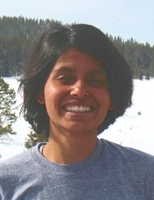2009 REU and REV Program Participant Profiles: Vishnupriya Khatri
 |
Major(s): Biology |
What is the purpose of your research?
The purpose of our research is to determine whether natural selection acts on certain synonymous codons in genes, and if selection for those codons increases with the position of the codon in the gene.
What does the research ultimately accomplish?
This research will help us further understand the process of protein production, and how evolution has shaped this process. It will also help us predict which path a ribosome will take to make a protein from the endless possibilities in genotype space of a protein. This information can help refine our ability to ask more intricate biological questions, and help us further understand an important biological concept.
Why did you apply to the REU/REV program?
Since the spring of my sophomore year in college, I have been working in a lab that uses math models to tackle biological questions. I really liked the work my lab was doing, and I wanted to learn more about it. Coming from a pure biological background, my understanding of math and computer science was very limited. I applied to the REU program to learn more about how math/computer science can be integrated into scientific research, and to expand my knowledge of the field.
What new experiences did you gain that have helped you today?
I learned a lot about group dynamics -- what times we need to work individually and what times its helpful to work as a group. I also gained some new skills in computer programming and statistics.
Would you recommend the REU/REV program to others?
I would definitely recommend this program to other students who are interested in an integrative approach to science.
NIMBioS
1122 Volunteer Blvd., Suite 106
University of Tennessee
Knoxville,
TN 37996-3410
PH: (865) 974-9334
FAX: (865) 974-9461
Contact NIMBioS


